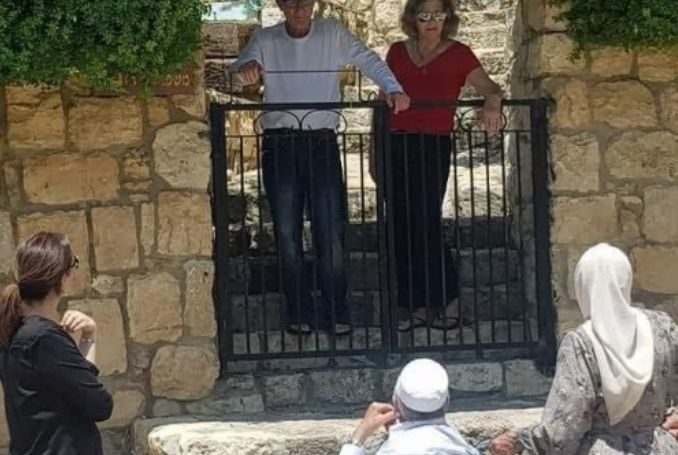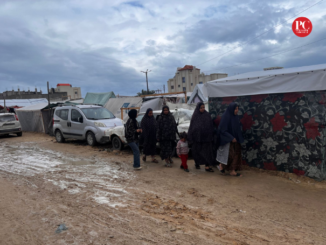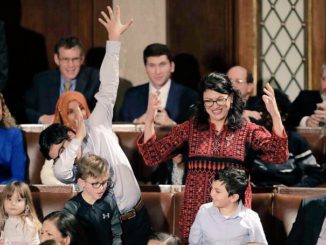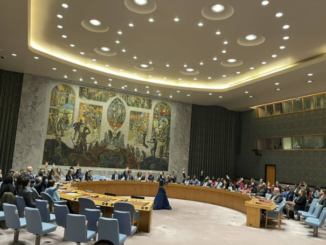
By Benay Blend
On Nakba 2020, a video clip of a tour through depopulated Palestinian villages within Israel circulated on social media. Narrated by Najwan Simri (translation provided by Rima Najjar), it features encounters between owners of the original Palestinian homes and their present Jewish occupants.
Located in the village of Ijzim, south of Haifa, the house in question, explains Abu Samir, “was our house, my father’s house. After the ’48 wars, the Jews occupied it.” When asked how they feel, residing in “a house built on the wreckage” of this man’s home, the current owner answered: “Frankly, I don’t feel anything. I am very happy. Living here is very enjoyable.”
“And so, an extreme picture!” concludes Simri. But not really, because this conversation reveals how the Nakba, a “catastrophe” that resulted in over 700,000 residents fleeing from their homes, becomes whitewashed from Israeli history so that occupants living now on the ruins of what were once Palestinian homes are able to go about their daily business in a way that seems quite normal.
In many ways this video recalls Annemarie Jacir’s Salt of this Sea (2008), the first full-length feature film by a Palestinian female director. As Maymanah Farhat explains, the plot revolves around Soraya (Suheir Hammad), a Palestinian woman born in Brooklyn who travels to Jaffa to see her family home only to find that an Israeli artist has transformed it into a gallery.
Referring to survivors of the Holocaust, Elie Wiesel might not appreciate his writing being used to amplify the voices of Palestinians:
“For the survivor who chooses to testify, it is clear: his duty is to bear witness for the dead and for the living. He has no right to deprive future generations of a past that belongs to our collective memory. To forget would be not only dangerous but offensive; to forget the dead would be akin to killing them a second time.”
Wiesel’s words bear witness to all those who have undergone oppression, including the ongoing genocide of Palestinians. Although against the occupation, the current resident won’t go so far as to acknowledge Soraya’s rightful ownership of the house. Like those who destroy ancient groves of olive trees; those who are only following orders to demolish Palestinian homes; and those who re-write history in order to erase the presence of original inhabitants on the landscape—this homeowner in reality is effectively severing Soraya from her long history on the land.
Indeed, here lies a fault line that afflicts much of the left in Israel and America, too, the failure to acknowledge that both countries were built on the blood of its original inhabitants, denial that allows each to normalize violence that continues in daily life.
Another film that portrays what happens when a people fail to make good on injustices of the past is Born in Flames (1983), director Lizzie Borden’s science fiction script set in near-future New York City. As Seren Sensei writes, it “eerily” predicts the consequences of an unfinished Social Democratic revolution in which sexism and racism persist.
As clashes with the police become more violent, movement leader Zella Wylie, played by activist Flo Kennedy, sends Adelaide, the leader of the Women’s Army, to the Sahara where she is tasked with learning self-defense from international women’s groups in the region. When Adelaide returns, she is illegally detained by the police and eventually found hanging in her cell, a fate prophetic of Sandra Bland, among others, who have more recently met that fate.
The film is “now having a renaissance,” Borden explains in a recent interview. “Who knew things could be worse for women now than back then in terms of polices?” Angry at obstacles that she felt on a personal level during Reagan’s era, Borden wanted “to make something inspiring, something that people would remember.” Growing interest in the film attests to its broader message, a significance that extends beyond gender issues to include what it means to be an activist in a fascist state.
“Under conditions of terror most people will comply but some people will not,” remarked the philosopher Hannah Arendt. “No more is required, and no more can reasonably be asked, for this planet to remain a place fit for human habitation.” The women in Born in Flames are clearly of the second category, for they risk their lives to bring down the murderous state. On the other hand, though the Israeli artist in Jacir’s film might oppose the occupation, she dismisses Soraya’s right to retake ownership of her house. Thus, in reality, she refuses to admit that she lives on stolen land.
There are many more horrendous acts that the Israeli government commits on a daily basis, atrocities that make the Israeli artist’s refusal to give up her home pale in comparison. Yet in Eichmann in Jerusalem: A Report on the Banality of Evil (1963), Arendt reflected that “the lesson that this long course in human wickedness has taught us” is that in such a world where there is widespread disconnect with reality, where no one can see beyond the lies, the “banality of evil takes hold.”
Arendt’s words remain relevant today as Israeli and American tyrants continue to perpetuate the atrocities that go back to their respective country’s founding. When slogans like “vote blue no matter who” make the rounds of social media and beyond, it conveys the notion that other lives—Palestinian and Black lives too, among the many others—are less than those who choose to vote for the lesser evil.
It’s understandable. Hatred towards Trump has grown to such dimension that it is often difficult to see the bigger picture.
According to Phillip Weiss, Democratic candidate Joe Biden has now broken with Obama’s albeit lukewarm criticism of the Israeli state. When Biden’s surrogate declares that “he won’t allow any ‘daylight’ between Israel and the United States, won’t air dirty laundry in public, won’t ever lower military aid” to the Zionist state, he is really voicing his employer’s support for genocide of the Palestinian people.
“From the pandemic, to climate change, to the use of technology,” writes Weiss, Biden, speaking through his spokesperson, has declared a partnership made in heaven with a country, Biden feels, has the “same values” as the United States. By ignoring the implications here, those who vote for him are condemning not only Palestinians to a never-ending Nakba, but also dooming their own country to the path that it has been on from the beginning.
As Steven Salaita tweeted on May 1:
“Please stop this shit about the presidential election being a battle for the ‘soul of America.’ Settler colonies have no souls, only ruling classes that want us to feel pious about their depravity.”
Returning to Born in Flames, Borden’s enigmatic title, does it refer to the final scene in which the more radical wing of women blow-up several high-rise buildings? Is there the hope that out of its flame will be born a new beginning? On the other hand, perhaps it relates more to what Salaita encapsulates in his tweet, the fiery birth of this nation (and many centuries later that of Israel), a conflagration that brings about a country founded on the blood of other people.
Decisions won’t be made in the voting booth, but instead in the way that people continue to organize house to house, neighborhood to neighborhood, and group to group, so that while electoral politics seems to offer only the choice of the lesser evil, there might be another route to change the values of both countries.
In Israel, the One State Foundation suggests an alternate route towards dismantling the Zionist state. In the United States The Red Nation (TRN) proposes a similar path. “Not about ‘healing’ or ‘getting-over-it,’” but rather a struggle for “repatriation of Native lives and land,” TRN advances an anti-capitalist, anti-colonial agenda that carries the past forward into a “world in which [all people] want to live.”
– Benay Blend earned her doctorate in American Studies from the University of New Mexico. Her scholarly works include Douglas Vakoch and Sam Mickey, Eds. (2017), “’Neither Homeland Nor Exile are Words’: ‘Situated Knowledge’ in the Works of Palestinian and Native American Writers”. She contributed this article to The Palestine Chronicle.

– Benay Blend earned her doctorate in American Studies from the University of New Mexico. Her scholarly works include Douglas Vakoch and Sam Mickey, Eds. (2017), “’Neither Homeland Nor Exile are Words’: ‘Situated Knowledge’ in the Works of Palestinian and Native American Writers”. She contributed this article to The Palestine Chronicle.







